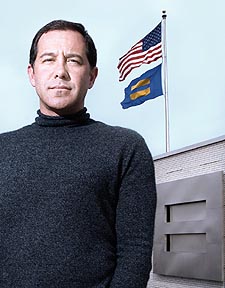Joe Solmonese
Leading HRC's charge
“This weekend is all about the election.”
As almost 200 people are streaming into D.C. for the Human Rights Campaign’s annual spring meeting, Joe Solmonese is laying out the course for the organization’s coming year. Having taken the helm of the nation’s largest GLBT organization a year ago, he’s eager to look forward to the latest political battles looming for the community — among them toppling Pennsylvania’s notoriously anti-gay Sen. Rick Santorum. Asked for a prediction on that bellwether race, Solmonese offers a smile and two words: “Going down.”

Looking at the agenda for HRC’s board and steering committee, he says winning that election and a host of others is the goal.
“This is a political rally and cry,” he says. “It’s a chance for us to tell people what our political priorities are, where the races are going to be, and to encourage them to work and get involved like they never have before.”
While it’s been a difficult year in many ways for GLBT issues as state constitutional amendments banning same-sex marriage continue to churn through legislatures, a newly constituted Supreme Court offers reduced hope of gay-friendly decisions, and anti-gay groups continue to search for new ways to use the GLBT community as a wedge issue.
But from Solmonese’s viewpoint, the past year has also enjoyed a share of success, from civil unions victories in some states to maintaining pro-gay policies in major corporations. And those successes, he says, point the way to victory in the long term.
In a broad ranging interview with Metro Weekly, Solmonese reviews some of the highlights of his first year with HRC — and what he sees as the next steps for the organization and the community.
METRO WEEKLY: How would you describe your past year at HRC?
JOE SOLMONESE: It’s certainly been the most exciting year of my life — I’ve loved every minute of it. It’s been daunting. In some ways it’s been what I expected and in other ways not so much, but on balance it’s been an unbelievably exciting experience.
MW: What’s been unexpected about it?
SOLMONESE: There are many more competing interests and moving pieces within our community than I had anticipated. There seem to be many different, complex points of view about how we collectively move forward. Sometimes that is a challenge. Sometimes there is unity and sometimes there are differences of opinion. Consensus is something that’s clearly important in moving us together in a unified, collective way.
MW: Do you think that the GLBT community is a little fractious? Or do you think there’s just a wide range of opinions on issues?
SOLMONESE: I think it’s a little bit of both. It depends on where you think we are on the spectrum of moving towards equality. You may think, as I do, that despite the marriage challenges and a Congress and an administration that’s out of step with the American people, that we’re still doing well in the states in terms of who we are electing; that we’re doing well in the workplace, in the colleges and universities; that we’re doing well in places where we have an opportunity to shape public opinion. [Among those who] think that, generally there tends to be a healthy difference of opinion around the edges.
If you are a more pessimistic person about where we are and you think we are in just a dire place, that mindset is where I find a more fractious community, as you described it.
MW: When people tell you that they think the situation is dire, what do they say is the reason?
SOLMONESE: Sometimes there is an impatience and a lack of an understanding about the progress toward social change and what that’s like. Sometimes an explosive event happens that is out of all of our hands, like a marriage decision in Massachusetts. There are all sorts of things that follow in the wake of that, but ultimately we come out ahead. It’s the two-steps-forward-one-step-back, leaping and creeping progress of social change. The marriage decision came down in Massachusetts two years ago, so we’re two years into this seismic shift in national dialogue around marriage. And are we in a good place in that dialogue? Possibly not — probably not — but we’re two years into this. This is probably going to be a 15-year struggle.
MW: Given that we’ve had so many losses with state constitutional amendments that will have repercussions for 20, 30 and 40 years, is the marriage fight winnable at all in the short or mid-term? Or is it something we’re going to have suck up as a loss and really focus on the long term?
SOLMONESE: I see it as a spectrum. If you look across the country, we’ve got decisions pending in places like Washington [state], Maryland, New Jersey. If we come to a day when we have full marriage equality in four states instead of one, what does that do to change the national perspective on marriage? If we have civil unions in half a dozen more states, what does that do to change the national perspective?
If you look at this election cycle, we’ve got tough fights in places like South Carolina and South Dakota. But I think we’ve got winnable fights in places like Arizona and Wisconsin. Then you have places like Florida and California where [marriage amendments] didn’t qualify for the ballot. Granted, there are differences of opinion about whether that has to do with this not being an issue that [anti-marriage groups] want to introduce into the elections in 2006 in California and it may be better [for them] for 2008. But I think using marriage as a wedge issue in elections is going to run its course.
MW: I know you’ve focused a lot on HRC’s corporate equality project. What do you consider the accomplishments over the past year in that project?
SOLMONESE: When I went to Coretta Scott King’s funeral, I was sitting in this church with 8,000 other people and I leaned over to the woman next to me and asked, ”Do they fill this church every Sunday?” And she said, ”They actually fill it twice every Sunday.” And I remember thinking, the people who are working against us rely on the authority of religion but they also rely on the power of the congregation — they have a captive audience through which to organize, mobilize and spread their messages.
What I think is so powerful about our corporate work is that we’re doing something very similar. We’re recognizing that there are places in this country where people congregate every day, places where we are all together whether we want to be or not. You show up every day at work and you are with five people or 5,000 people — that is an opening for us to go in and speak to people where they congregate.
[With HRC’s] corporate equality index score, a year ago we had 66 companies with a score of 100. This year we gave 104 companies a score of 100. That means that 5.6 million people are now working in a place where they are treated with the same benefits, same respect, same access to opportunity. That’s why it’s so important, because to me that is how we are battling the religious right. And whether it’s there or whether it’s on university campuses or in hospitals. We’re going to launch a hospital project in conjunction with the Gay and Lesbian Medical Association to essentially do the same thing, to make sure that when our community walks into a hospital setting, they are treated with the same respect and the same rights as everybody else.
MW: During the controversy over Ford and the American Family Association (AFA) boycott late last year, it became apparent that while on the one hand the AFA was saying ”This is just about advertising,” if you talk to them a little bit longer, you find they actually want to strip away domestic partner benefits and every other pro-GLBT corporate policy. Do you see those anti-gay groups making headway on their goals?
SOLMONESE: We have not seen any corporations back off on their internal policies with regard to their workforce in domestic partner benefits. We just haven’t seen it. It isn’t as though there haven’t been demands for changes within corporate America from the other side or threats of boycotts, but we just haven’t seen it. We talk an awful lot to corporate leadership in places like Ford and other Fortune 500 companies and they seem to be standing strong. There certainly have been bumps in the road to equality, whether it was with Microsoft or Ford or others, but they seem to be standing pretty strong on their workplace policies.
MW: Even though the AFA and other groups may not achieve their immediate goals of rolling back pro-gay policies, are they strengthening themselves in some ways just through the battle itself?
SOLMONESE: Sure, because when they do these things it’s a powerful fundraising message. They give the impression that the boycotts are working. As often as not they’ll call off a boycott as having been successful without any real evidence to suggest that it was, but again, it’s a powerful fundraising message. And that’s clearly empowering the organization.
MW: Are these boycotts and such by AFA and other groups diverting attention or resources for HRC or for the GLBT movement in general?
SOLMONESE: If you’re going to move at lightning speed the way we have in changing corporate America’s culture with regard to the GLBT community, then you also have to anticipate a ferocious last-ditch effort on the other side. So whether it’s Ford having the situation that it did — although Ford is now back where we hoped that they would be — to me those skirmishes around the edges that flare up are certainly worth it, given where we are.
MW: Bloggers and Internet activists were among those heavily involved in publicizing the Ford boycott story, and I know some were disappointed that the national GLBT groups seemed to get all the credit for the success of the effort.
SOLMONESE: Here’s the thing, and the people at Ford would probably tell you the same thing. My job is to try to convince Ford Motor Company to go back to the policy and the practice that they had in advertising their brands [in gay publications]. There was a group of six of us [from different GLBT organizations] who went in to talk to them about it. It was a thoughtful back-and-forth. I think those of us who were involved in [those discussions] were pretty strategic. And Ford came down where we wanted them to come down. I know that we never stepped back, we never capitulated in those conversations, there was nothing to suggest that we were in any way less than on top of that situation. And the question you asked about — who should go in the room and who shouldn’t — Ford said these are the people we want to come in. So we were successful, let’s move on to the next thing.
 Solmonese |
MW: You have so many organizations headquartered in D.C., plus you have a lot of political players or people who want to be players or people who were players. Do the politics and ambition of the city sometimes overwhelm the actual message?
SOLMONESE: I don’t think so. When I was at EMILY’s List, occasionally someone would say to me, ”Why don’t all you women’s groups just merge into one?” First of all, that’s an insulting thing to say to women, that you should not only merge all your groups into one, but merge all your specific or subtly nuanced interests into one. It’s the same thing with the groups here. The Victory Fund is a very specific thing. GLAAD is a very specific thing. Lambda Legal, the Mautner Project — everyone has a specific role that they play in the movement and they represent a specific constituency.
I think that Matt Foreman at the Task Force and I have worked very well together. The thing that I admire about Matt Foreman more than anything is that he really understands the process of social change. Sometimes his voice and mine are going to be different, but collectively both are necessary. That is one of the reasons we work well together and that there doesn’t seem to be this ”who’s doing what” issue.
MW: There’s always been some perception of the Task Force being the more leftward, progressive organization, while HRC has traditionally been viewed as more mainstream and corporate-focused. But if you are working together more closely, could that be viewed as a sign that HRC is moving more progressive, more left wing?
SOLMONESE: I think people are over-thinking things a bit. There is a natural synergy that happens around issues, whether it’s federal legislation or whether it’s a corporation moving away from where we would like them to be. Our natural working relationship, at least to my way of thinking, seems to work quite well. I think of the Task Force as maybe having more of a grassroots culture and perhaps appealing to a different segment of the community than we do. But that’s not a bad thing — that’s actually a good thing. I think if you are a conservative Republican who thinks that we are too far to the left, or the Task Force is too far to the left, you’re probably a member of the Log Cabin Republicans, and the Log Cabin Republicans play a hugely important role in this collective work. But I think all of this about where HRC is going and where we’re moving — it’s really this sort of heady political theory that maybe I don’t spend enough time thinking about. [Laughs.]
MW: USA Today recently reported on gay adoption being the new big issue for anti-gay activists. Some people say it’s not going to be an issue that flies. Some people think it will. What’s your perspective on that and how is that going to play into what HRC’s plans?
SOLMONESE: I don’t think it’s going to be the issue that people think it is. We’ve polled in a handful of states around this issue, and the numbers are nowhere near where they are on marriage. The idea that this is going to be the next wedge issue, I just don’t see it. As we’ve seen in places like Georgia, there’s not a lot of movement within the legislatures to push these things. This is not something that is going to do what I think the other side would like it to do. It’s given the other side pause as to whether or not this is something they want to move on in these elections.
MW: Because children and homosexuality can be such a cultural flashpoint, is this an issue that’s vulnerable to TV ads and such that may set it on fire in a way that we don’t expect?
SOLMONESE: It might be, but from what we’ve seen in the research that we’ve done, people have a real interest in children being in the best circumstances that they can be in, an interest in children being in loving homes. When you talk about overturning something that people in the states perceive is in existence — the ability of gays and lesbians to adopt children, to have children — turning back that right is not something that people are eager to do. At least that’s what we have seen in the states that we’ve taken a look at.
MW: For a long time, during every presidential election we were told how important it was to elect a Democrat because of Supreme Court nominations. But the expected battle didn’t seem to play out the way many expected it to during the nominations of John Roberts and Samuel Alito.
SOLMONESE: I suspect that there was a complacency in this country. There are people who voted for George Bush the first time around who didn’t believe that he’d every really act on anything that would impede reproductive freedom for women. People say all the time, ”I voted for George Bush because it was a dollars and cents decision — it all came down to how much more money I’d take home at the end of the week.” No one should be alarmed that there are lots of Americans out there who make that decision and don’t think much beyond that. The Supreme Court and its decisions seem so abstract from where they are in their lives anyway. The reelection of George Bush and these appointments that he made are going to impact us for a generation.
MW: The accusation was made that HRC was not doing enough or willing to expend its political capital on the Supreme Court nomination fights. How do you respond to that?
SOLMONESE: Well, we certainly took a strong position in each of those fights. There were some people who questioned why we came out before the hearings — we came out against Roberts before the hearings. We did it because I thought that this [idea] of “Let these people go to the hearings and learn what they are really about,” was the silliest thing I heard. If you’ve watched any of these [nomination hearings], you know that you don’t learn anything. All of the questions and all of the answers are designed to make sure we don’t learn anything.
But in each of these fights, we reached out to our membership. We sent out action lists, we mobilized our membership to the degree that we could. I don’t know what more people would expect us to do. I don’t know that they would expect HRC would be the people who would launch television campaigns against these guys. There were some organizations for whom this is their core mission, and even they were kind of choosing their battles. A lot of our members said to us ”Look, George Bush got reelected. You’ve got a Republican-controlled House and Senate and these people are going to go through.” But we certainly did what I think HRC’s role was in that, which is communicate with our membership and encourage them to talk with their elected officials, contact their senators, contact their members of Congress and speak out.
MW: Obviously, South Dakota’s recent passage of legislation barring abortion in order to set up a court challenge to Roe v. Wade is a sign that abortion is going to become an even hotter political fight. Since the gay community has pretty strong coalitions with the pro-choice community, and the issue has been fairly intertwined with GLBT issues, is this something that could be problematic down the road? Is there room in the movement for gay and lesbian people who are pro-life?
SOLMONESE: The simple answer is that they certainly fit into the movement. There are certainly pro-gay people out there who aren’t pro-choice. Case in point is Bob Casey, someone we are working hard to elect and to make sure he defeats [Pennsylvania Sen.] Rick Santorum. So there certainly are candidates that pro-life members of the GLBT community can support and get involved with.
When you talk about us being intertwined, we are intertwined as a legal argument. There are certainly differences of opinion about this, but I think we’re intertwined under the broader principle of an individual’s right to privacy. You have to be careful about how you characterize us as being intertwined with choice groups because you could just as easily say we are intertwined with environmental groups, given that we work as part of [a number of] broader progressive coalitions.
MW: Still, you have GLBT organizations that require pro-choice positions to receive funding or support, and most GLBT groups would not accept, say, a pro-life executive director. Looking ahead at trends of gay and lesbian families, as you have more gays and lesbians raising their own children, and their own children start being sexually active and possibly getting pregnant, is there a possibility that we’re going to see some swings in terms of how people feel about abortion issues such as parental notification?
SOLMONESE: I don’t think that I could make any kind of prediction about the aging of our community and their children and how these circumstances present themselves. But to look ahead 10 or 15 years, is our community of gay and lesbian parents of teenagers going to be as pro-choice as the GLBT community is generally? I would think so. But when you get down to some of the minutia of the issue, such as how are they going to feel about questions like parental notification, perhaps they will be more representative of the general public.
|
Related articles: Finding Common Ground – Joe Solmonese takes the helm at HRC (5/12/2005) Roll Over – Ford puts itself at the center of the latest battle over gays and corporate America Losing an Ally – Gay leaders mourn the death of Coretta Scott King |
MW: How do you define a member of HRC?
SOLMONESE: I think of the membership of HRC as being the universe of people who either contribute to HRC or who are part of HRC because they are available to us to contribute in another way. For instance, we’ve got your e-mail address and you are someone who gets information from us and gets Action Alerts from us and goes out and contacts your member of Congress, or goes to canvass in a neighborhood or takes action on behalf of HRC. I think of the membership of HRC as encompassing that broad universe of people. Now, of the 600,000 members of HRC, how many people contributed money in the last couple of years? That number for HRC is roughly 385,000 of the 600,000.
MW: What do you feel about the chances of at least one branch of Congress moving out of Republican control in the near future?
SOLMONESE: The chances of a switch in control of either chamber gets better every day of this election cycle, probably more likely in the Senate than in the House. There is a seismic shift among the American people over the last year or so from fear to anger, which is what is prompting, as it often does, an interest in change — just throw the bums out and make change. If that is the sentiment going into these elections, and if the administration continues to be seen as incompetent, as it is, then those incumbent Republicans are going to be the targets of voters as they look to make that change.
MW: I wouldn’t call my own family radically conservative, but we are from a very Republican state. While they may be sympathetic to GLBT issues because of me, many of them voted for Bush for war reasons and for security reasons. How do you make the argument to people who are fairly sympathetic to our issues, yet still vote based on those other issues?
SOLMONESE: You have to really ratchet that conversation up another level, which is to remind people what their decision says about how they feel towards you. What they are choosing in their life over you and your well-being. We don’t do that enough. We don’t draw a line in the sand with our friends and our family, and say “As a friend of mine or as a member of my family, I need you to understand that in making this decision, this is what you are saying about me.” We have to do that in some pretty graphic ways with people, much more so than we have been. Because when it’s a friend or a family member, there’s a point in that political conversation where you don’t want to go beyond, a point where you just say, ”I guess that’s the end of it and we’re not going to bring this up again.” How many people do you hear say, ”He’s a great guy, and we just don’t talk about politics.” That’s just not going to work anymore.
Support Metro Weekly’s Journalism
These are challenging times for news organizations. And yet it’s crucial we stay active and provide vital resources and information to both our local readers and the world. So won’t you please take a moment and consider supporting Metro Weekly with a membership? For as little as $5 a month, you can help ensure Metro Weekly magazine and MetroWeekly.com remain free, viable resources as we provide the best, most diverse, culturally-resonant LGBTQ coverage in both the D.C. region and around the world. Memberships come with exclusive perks and discounts, your own personal digital delivery of each week’s magazine (and an archive), access to our Member's Lounge when it launches this fall, and exclusive members-only items like Metro Weekly Membership Mugs and Tote Bags! Check out all our membership levels here and please join us today!
























